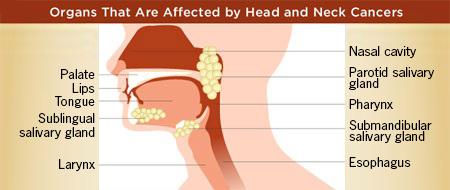Head and neck cancer is cancer that is in the mouth, nose, or throat. Affected areas can include:
- Lips
- Tongue
- Salivary glands
- Pharynx: the tube that starts behind the nose and goes down the throat
- Larynx: the voice box

In 2016, approximately 48,000 people in the United States are expected to be diagnosed with cancers of the head and neck. Treatment depends on the site and stage of the cancer. Treatment may include one or more of the following:
- Surgery
- Radiation therapy
- Chemotherapy (chemo)
Saving organ function may be an important treatment goal. Organs of the head and neck play a critical role in daily life. For example, in patients with cancer of the larynx, preserving the ability to speak may be a major concern. For these patients, efforts are made to keep the larynx intact during therapy. Follow-up care is a key part of the treatment plan for patients with this kind of cancer.
Chemo Can Cause Side Effects
Chemo stops or slows the growth of cancer cells. Often, cancer cells are fast growing. But chemo also damages healthy cells that divide quickly. These healthy cells can include cells in the bone marrow that make blood, cells in the lining of the gut and mouth, and hair cells. Damage to healthy cells is what causes many chemo side effects. Here's how it works:
- When chemo damages healthy blood cells, the result can be:
- anemia (low red blood cells), which could make you feel extremely weak or tired
- neutropenia (low white blood cells), which could leave you open to infection
- thrombocytopenia (low platelets), which may cause bruising or bleeding
- Chemo may damage healthy cells in the stomach. The chemo medications then irritate these areas, which could result in nausea and vomiting. Chemo medications may also trigger signals in the brain that tell your body to vomit.
- When chemo affects healthy cells surrounding hair follicles, the result can be hair loss. Hair loss is also known as alopecia.
Chemo can cause many other side effects, but the good news is that there may be ways to manage them.
Learn more about chemo side effects and how to manage them.
|
A Closer Look: Jimmy*
 |
|---|
| A young husband and father, Jimmy learns he has a large tumor in his sinus cavity. |
| His doctor prescribes radiation and a chemo treatment to shrink the tumor. After, the doctor plans to have the tumor removed with surgery. |
Jimmy's doctor tells him that radiation and the chemo treatment are known to cause certain chemo side effects. These include:
|
| Jimmy is afraid to speak with his doctor or ask too many questions. He doesn't want to be a bother. |
| He brings his wife along to some of his visits. She asks the doctor about how to prepare for or help manage chemo side effects. |
| She takes notes about what they can do to prepare. |
| Jimmy's doctor works up a plan that includes managing chemo side effects. |
| Jimmy also learns that he will get medication before and during chemo that will help manage nausea and vomiting. |
*This is a fictional case study based on chemo patient experiences. Your experience is unique. Your doctor and care team will create a plan that will best treat your type of cancer and manage your chemo side effects.
Learn more about managing chemo side effects and make sure to speak with your doctor and care team to plan for managing chemo side effects.
Check out these questions to help you prepare.
Click here for a discussion guide about chemo and infection to use with your healthcare team.
Head and Neck Cancer Resources
-
The Chemotherapy and Infection Discussion Guide can help you understand your
risk of infectionInfection can be a serious side effect of strong chemo. Find out the factors that affect your risk of infection. Simply answer a few questions, and then print your results to share with your doctor.
Use the Chemotherapy and Infection Discussion Guide to find out more. -
Want to learn about specific chemo side effects?
- Learn about GI chemo side effects
- Learn about numbness, tingling, and pain
- Learn about risk of low white blood cell count
- Learn about low red blood cell count

 Enlarge
Enlarge Email
Email Print
Print